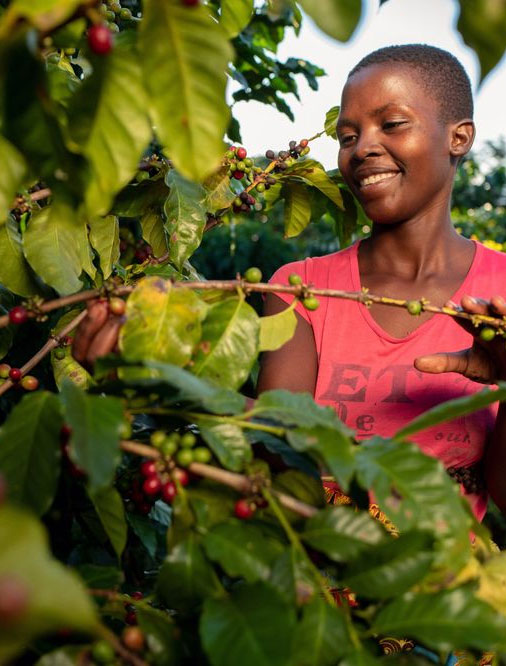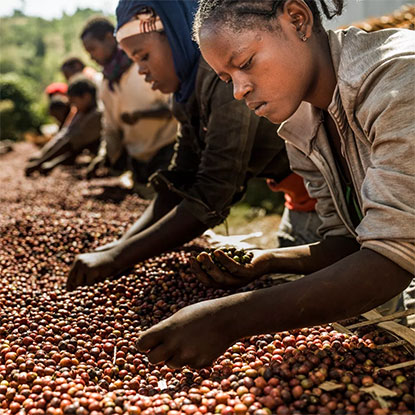Arabusta: a rare hubrid coffee from the Ivory Coast

A "lost", hybrid variety of coffee that may be of concern to us in the future: the African Arabusta!
Whichever coffee you prefer, and from any (distant) corner of the world and whether it starts to reach our cup, it is almost certain that it will belong to one of the two varieties that make up 98% of the world production as it will be either Arabica either Robusta. In the past, we have been examining a rare, ignorant African coffee variety, Liberica, but we also come across a hybrid coffee variety that, as its name implies, is a cross between Arabica and Robusta, which hides its own interesting story: Arabusta .
 How was Arabusta born?
How was Arabusta born?
The birth of Arabusta is located on the island of Timor, Indonesia, and is due to the spread of a fungus called Coffee Rust. This particular fungus attacks the Arabica coffee beans, which have reduced resistance to parasites, diseases and weeds. Coffee Rust appears from time to time in the "coffee belt", that is to say, in almost all the coffe-producing countries, with many destructive results, resulting in the destruction of the crop and the increase in coffee prices internationally. The most destructive effect of the fungus is in Asia, where it totally destroyed all Ceylon coffee trees - something that played a major role for locals to adopt tea as the main exportable product, and also the British to make it a national drink.
Coffee farmers on the island of Timor were looking for a way to protect their valuable coffee trees from the fungus, observing at the same time that Robusta's (subtler) variety showed significantly more resistance to the disease. So, they proceeded to "mating" the two varieties, and the result was a hybrid that combined Arabica's flavor with Robusta's durability. The new variety of coffee was named "Timor Hybrid" or, as the dams call it, "Tim Tim" or "Bor Bor".
The hybrid spreads in West Africa
From South-East Asia, the idea of mating between Arabica and Robusta went to West Africa, to a country that until recently was one of the largest Robusta producers around the world. For Ivory Coast, coffee (along with cocoa) is the main exportable product and one of the main pillars of the national economy. Being a former French colony, the Ivory Coast gained its independence in the 1960s and turned intensively into the cultivation and export of coffee.
 Attempting to improve the quality of the coffee produced, the Ivorian farmers, led by the government, turned to Arabica cultivation, but efforts were unsuccessful, as Arabica coffee requires a high altitude, which is not the case in the African country. Thus, the agronomists, inspired by the Timor hybrid, re-coupled the two varieties, ending up with Arabusta. The result was a variety of coffee that brought the flavor of African Arabica, combined with the intensity and robustness of Robusta, which could thrive on Ivory Coast's climatic conditions and morphological relief. Along with the Robusta export, the African country has been exporting Arabusta for years, achieving even better prices.
Attempting to improve the quality of the coffee produced, the Ivorian farmers, led by the government, turned to Arabica cultivation, but efforts were unsuccessful, as Arabica coffee requires a high altitude, which is not the case in the African country. Thus, the agronomists, inspired by the Timor hybrid, re-coupled the two varieties, ending up with Arabusta. The result was a variety of coffee that brought the flavor of African Arabica, combined with the intensity and robustness of Robusta, which could thrive on Ivory Coast's climatic conditions and morphological relief. Along with the Robusta export, the African country has been exporting Arabusta for years, achieving even better prices.
Which is the future of Arabusta?
The course of Ivory Coast's coffee production followed the same turbulent course with the history of the country. Due to the continuous civil wars, the crops were abandoned, the quality of coffee fell sharply and the country ceased to be considered a force in the coffee sector. Together with the general decline of the coffee industry in Ivory Coast, the cultivation of the hybrid has shrunk so much that it has reached the brink of extinction. However, in recent years an attempt has been made to rejuvenate the coffee industry in the country with the coffee industry showing stable numbers and continually improving in terms of quality. In this rebirth of coffee growing in the West African country, it is certain that Arabusta's "resurrection" will play its own, special role.
The world of coffee does not stop surprising even those who think they know it well! Maybe in a few years we have to choose between three varieties of coffee, except Arabica, Robusta and their blends. African Arabusta may return to conquer our cups.










